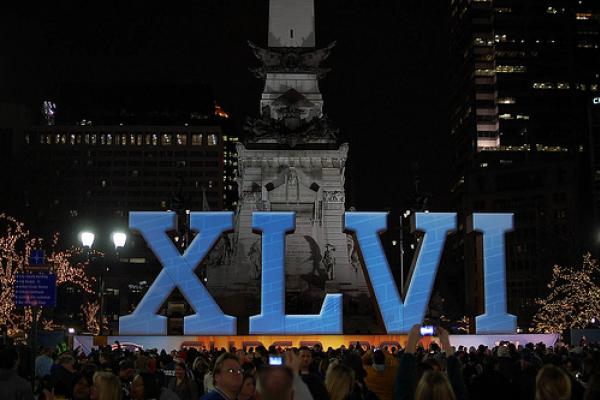America’s annual sports extravaganza, the pro football Super Bowl, will be played Sunday in Indianapolis, IN. And everything about it becomes a “super” excess.
Television commercials this year cost $3.5 million for a 30-second spot during the game's broadcast, which has become the most-viewed show on television. Last year, an estimated 111 million people tuned in to watch the Green Bay Packers beat the Pittsburgh Steelers 31-25 in Superbowl XLV, setting a new viewership record for a single event. In fact, of the five most watched events in U.S. television history, four are Super Bowl games (the fifth was the final episode of M*A*S*H* in 1983). Last year, $87.5 million was legally wagered on Super Bowl XLV, mostly via Las Vegas, and the amount is expected to be even higher this year.
Given the game's role as the preeminent icon of American popular sports culture, it’s not surprising that the struggles and problems of the larger society intrude on Super Bowl Sunday. Two new laws were signed this week by Indiana Governor Mitch Daniels — one good and one bad — that directly relate to this Sunday's game.
First, the good. The seamy underside of the Super Bowl is the increase in sex trafficking that accompanies it. Like any large gathering of people, it attracts traffickers peddling their victims, many of them minors.
Over the last few weeks, 11 orders of Catholic sisters, joined by students, compiled a list of the managers at 220 hotels in the Indianapolis area. They then began calling, asking questions to see if the managers were aware of the sex trafficking issue and whether they wanted materials to help educate their staffs. The information included how to recognize the signs of trafficking, and whom to contact if it is suspected. Two-hundred managers answered questions; 99 asked for materials, while 45 others already had trained or planned to educated their staffs about trafficking.
Another citizen effort is training cab drivers about how to recognize sex traffickers. Valerie Schmitt, coordinator of a human-trafficking outreach effort, told cabdrivers, “You’re our eyes and our ears ... You meet a lot of people and overhear a lot of conversations that might be helpful in recognizing someone involved in [sex] trafficking.”
The Indiana state government also responded. On Tuesday, Daniels signed into law legislation designed to tighten loopholes that have made the prosecution of traffickers difficult in the past. The new law makes “recruiting, transporting or harboring anyone younger than 16 for prostitution or other sexual conduct a felony punishable by 20 to 50 years in prison.”
Abigail Kuzma, the Indiana attorney general’s designee on an Indiana Protection for Abused and Trafficked Humans taskforce, said: "We have to be alert to protect these children. We probably will never know how many people are trafficked here because it's so easy to hide the victims.”
I applaud the efforts of both community activists and the state government. Trafficking is one of the most insidious plagues of our society, with an estimated 100,000 American children victimized through prostitution each year. It will take continued cooperation between citizens’ groups and government to stop it.
Second, the bad. On Wednesday, Indiana's governor also signed a so-called “right to work” law, which makes it illegal to negotiate bargaining agreements that require workers to pay union dues and for unions to collect dues from non-members. It’s the latest state attempt to reduce or eliminate collective bargaining by workers, and the legislation predictably has produced strong opposition from organized labor.
Earlier in the day, following final passage of the legislation by the state senate, thousands of protesters who had been demonstrating at the statehouse marched to the Super Bowl Village near Lucas Oil Stadium, the site of Sunday’s game. Union leaders have hinted at the possibility of actions related to the game, perhaps including a rally at the stadium and leafleting game attendees on Sunday.
Their possible trump card is the NFL Players’ Association. At the “media day” this week, DeMaurice Smith, executive director of the NFLPA, explained the union’s opposition to the law, noting its own struggle with management during a lockout last summer.
“When it comes to issues like right to work legislation, and what we believe is the rightful and important ability to unify for collective action, anywhere there is a fight over that fundamental right to build teams among workers, that’s where we’re going to be,” Smith said. “The lockout taught us an important lesson about our ability to stay together. While we’re out here, we’re going to make sure the folks who work for a living and unions they belong to know we appreciate them, we appreciate the strength they gave us for our fight.”
So, if you’re watching Super Bowl XLVI, cheering your team to victory, please also remember the victims of trafficking and the rights of workers. Both deserve our whole-hearted support.
And as for the game itself, with thanks to my colleague James Colten, just remember: God is neither a New York Giant, nor a New England Patriot.
Duane Shank is Senior Policy Advisor for Sojourners. Follow Duane on Twitter @DShankDC.
Got something to say about what you're reading? We value your feedback!
